初中被动语态专题
初中英语动词被动语态专项训练100(附答案)及解析
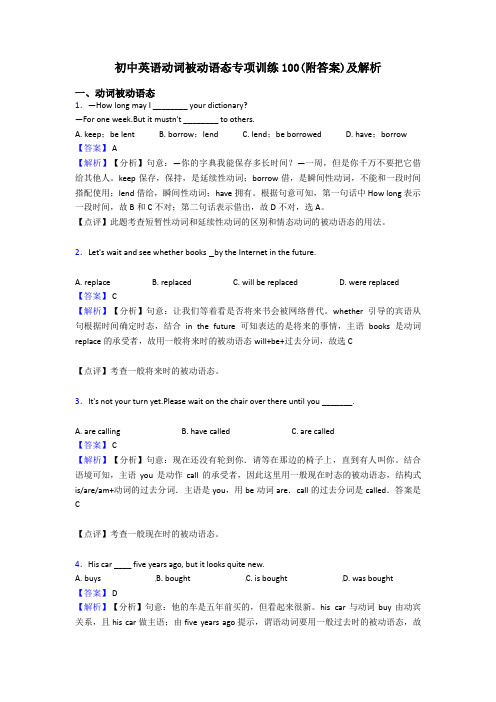
初中英语动词被动语态专项训练100(附答案)及解析一、动词被动语态1.—How long may I ________ your dictionary?—For one week.But it mustn't ________ to others.A. keep;be lentB. borrow;lendC. lend;be borrowedD. have;borrow 【答案】 A【解析】【分析】句意:—你的字典我能保存多长时间?—一周,但是你千万不要把它借给其他人。
keep保存,保持,是延续性动词;borrow借,是瞬间性动词,不能和一段时间搭配使用;lend借给,瞬间性动词;have拥有。
根据句意可知,第一句话中How long 表示一段时间,故B和C不对;第二句话表示借出,故D不对,选A。
【点评】此题考查短暂性动词和延续性动词的区别和情态动词的被动语态的用法。
2.Let's wait and see whether books by the Internet in the future.A. replaceB. replacedC. will be replacedD. were replaced【答案】 C【解析】【分析】句意:让我们等着看是否将来书会被网络替代。
whether引导的宾语从句根据时间确定时态,结合in the future可知表达的是将来的事情,主语books是动词replace的承受者,故用一般将来时的被动语态will+be+过去分词,故选C【点评】考查一般将来时的被动语态。
3.It's not your turn yet.Please wait on the chair over there until you _______.A. are callingB. have calledC. are called【答案】 C【解析】【分析】句意:现在还没有轮到你.请等在那边的椅子上,直到有人叫你。
2022届初中英语一般现在时的被动语态真题
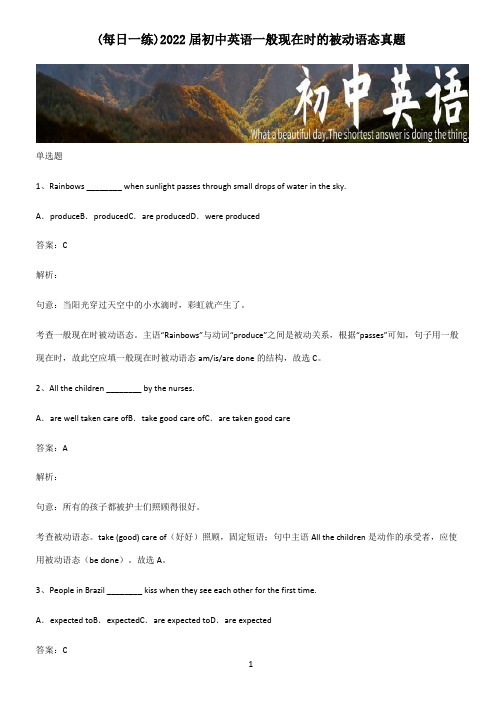
(每日一练)2022届初中英语一般现在时的被动语态真题单选题1、Rainbows ________ when sunlight passes through small drops of water in the sky. A.produceB.producedC.are producedD.were produced答案:C解析:句意:当阳光穿过天空中的小水滴时,彩虹就产生了。
考查一般现在时被动语态。
主语“Rainbows”与动词“produce”之间是被动关系,根据“passes”可知,句子用一般现在时,故此空应填一般现在时被动语态am/is/are done的结构,故选C。
2、All the children ________ by the nurses.A.are well taken care ofB.take good care ofC.are taken good care答案:A解析:句意:所有的孩子都被护士们照顾得很好。
考查被动语态。
take (good) care of(好好)照顾,固定短语;句中主语All the children是动作的承受者,应使用被动语态(be done)。
故选A。
3、People in Brazil ________ kiss when they see each other for the first time.A.expected toB.expectedC.are expected toD.are expected答案:C句意:在巴西,人们期望在第一次见面时亲吻对方。
考查动词语态辨析。
expect sb. to do sth.期望某人做某事,固定短语,可排除BD两项;本句people作主语,是动词expect的受动者,需用be expected to do sth.被动结构,表示“被对方亲吻”。
故选C。
4、Don’t dig here. These thin wires ________ thick wires that are buried under the street.A.are connected toB.are connectedC.connected toD.connected with答案:A解析:句意:不要在这里挖。
初中英语语法被动语态专题
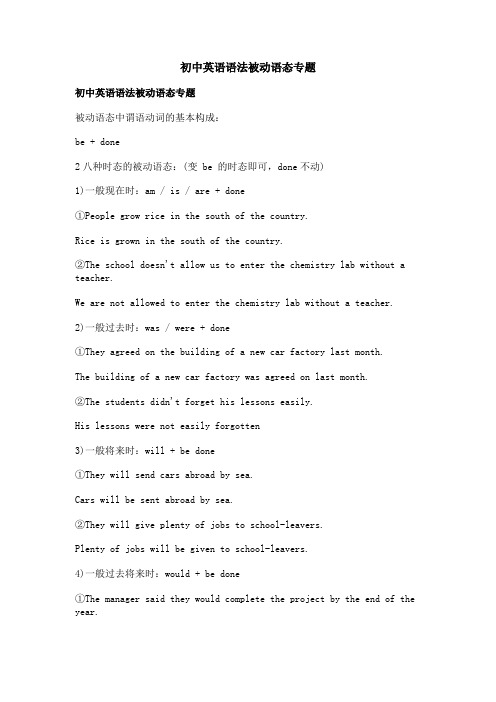
初中英语语法被动语态专题初中英语语法被动语态专题被动语态中谓语动词的基本构成:be + done2八种时态的被动语态:(变 be 的时态即可,done不动)1)一般现在时:am / is / are + done①People grow rice in the south of the country.Rice is grown in the south of the country.②The school doesn't allow us to enter the chemistry lab without a teacher.We are not allowed to enter the chemistry lab without a teacher.2)一般过去时:was / were + done①They agreed on the building of a new car factory last month.The building of a new car factory was agreed on last month.②The students didn't forget his lessons easily.His lessons were not easily forgotten3)一般将来时:will + be done①They will send cars abroad by sea.Cars will be sent abroad by sea.②They will give plenty o f jobs to school-leavers.Plenty of jobs will be given to school-leavers.4)一般过去将来时:would + be done①The manager said they would complete the project by the end of the year.The manager said the project would be completed by the end of the year.② The workers told me they would mend the car as soon as possible.The workers told me that the car would be mended as soon as possible.5)现在进行时:am / is / are + being + done①The radio is broadcasting English lessons.English lessons are being broadcasted on the radio.② We are painting the rooms.The rooms are being painted.6)过去进行时:was / were + being + done①The workers were mending the road.The road was being mended.②This time last year we were planting trees here.Trees were being planted here this time last year.7)现在完成时:have / has + been + done①Someone has told me the sports meeting might be put off.I have been told the sports meeting might be put off.②He has brought his book here.His book has been brought here.8)过去完成时:had + been + done①When I got to the theatre, I found they had already sold out the tickets.When I got to the theatre, I found the tickets had already been sold out.② The whole country was very sad at the news of his death; people had considered him to be a great leader.The whole country was very sad at the news of his death; he had been considered to be a great leader3含有情态动词的被动语态:情态动词+ be+ done①You must hand in your compositions after class.Your compositions must be handed in after class.②He can write a great many letters with the computer.A great many letters can be written with the computer by him.4被动语态的使用情况:1)当不知道或没有必要指出动作的执行者时,这时往往不用by 短语。
初中英语被动语态专项练习(附带答案)
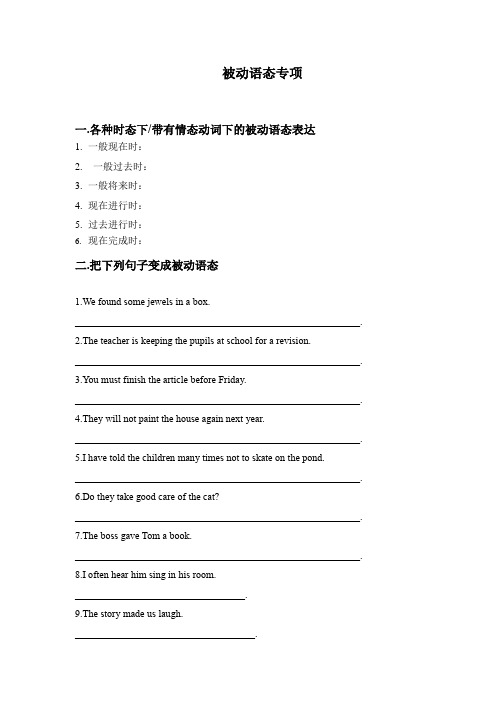
被动语态专项一.各种时态下/带有情态动词下的被动语态表达1.一般现在时:2.一般过去时:3.一般将来时:4.现在进行时:5.过去进行时:6.现在完成时:二.把下列句子变成被动语态1.We found some jewels in a box._________________________________________________________.2.The teacher is keeping the pupils at school for a revision._________________________________________________________.3.You must finish the article before Friday._________________________________________________________.4.They will not paint the house again next year._________________________________________________________.5.I have told the children many times not to skate on the pond._________________________________________________________.6.Do they take good care of the cat?_________________________________________________________.7.The boss gave Tom a book._________________________________________________________.8.I often hear him sing in his room.__________________________________.9.The story made us laugh.____________________________________.三.单项填空( ) 1 Now these magazines___ in the library for a long time.A.have keptB. are keepingC. have been keepingD. have been kept( ) 2 The pot ___ for ___ hot water.A. used; keepingB. was used; keepingC. is used; to keepD. are used; keep( ) 3 Tea ___ in the south of China.A.growsB. is grownC. were grownD. will grow( ) 4 The bridges___ two years ago.A. is builtB. builtC. were builtD. was built( ) 5 Wet clothes are often ___ up near a fire in rainy weather.A. hangB. hangedC. hangingD. hung( ) 6. The river smells terrible. People must ___ dirty things into it.A. be stopped to throwB. be stopped from throwingB.stop to throw D. stop from throwing( ) 7. The teapot ___ water.A.is filled withB. filled ofC. fulling ofD. filled( ) 8. Old people must be looked after well and ___ politely.A. speak toB. spokenC. speakD. spoken to( ) 9. Newly-born babies___in hospital.A. are taken good careB. are taken good care ofC.take good care ofD. take good care( )10. They were___ at the sudden noise.A. frighteningB. frightenedC. frightenD. frightens( ) 11.These walls___stone.A. are made ofB. made ofC. are made intoD. made into( ) 12 Jane ___ to sing us an American song last Saturday.A. calledB. was askedC. toldD. was said( ) 13. The papers ___ to them.A.were shownB. showC. shownD. have shown( ) 14.The coat___her sister.A.made toB. were made forC. was made forD. was made to( ) 15. I ___ five minutes to decide whether I should go or not.A. gaveB. was givingC. had givenD. was given( ) 16. The teacher made him___ his homework.A.to doB. doC. didD. done( ) 17.The boy___ streets without pay in the old days.A. was made to cleanB. made cleanB.made to clean D. was made clean( ) 18. These children____dance.A.were seen toB. were seen forC. were seenD. saw to( )19. The important meeting ___ on a cold morning last year.A. was heldingB. was heldC. heldD. hold( )20 Great changes___ in the past ten years in China.A. took placeB. have taken placeC. were taking placeD. had taken place( )21. The People's Republic of China ___ on October 1, 1949.A. foundB. was foundedC. is foundedD. was found( )22. English ____ in Canada.A.speaksB. are spokenC. is speakingD. is spoken( )23. Our room must ___ clean.A. keepB. be keptC. to be keptD. to keep( )24. -I'd like to buy that coat.-I'm sorry. ___. A. it sold B. it's selling C. It's been sold D. it had been sold ( )25. A new house ___ at the corner of the road these days.A. is buildingB. is being builtC. been builtD. be building( ) 26. The key ___on the table when I leave.A. was leftB. will be leftC. is leftD. has been left( ) 27. Doctors ___ in every part of the world.A. needB. are needingC. are neededD. will need( ) 28. His new book___ next month.A. will be publishedB. is publishingC. is being publishedD. has been published( ) 29 ___ the watch been repaired yet? I badly need it.A. DoesB. HasC. IsD. Are( ) 30. The books may___ for two weeks.A. be keptB. be borrowedC. keepD. borrow( ) 31. The broken bike____ here by Mr Smith.A. can mendB. can mendedC. can be mendD. can be mended ( ) 32. The play ___ at the theatre next Sunday.A. is going to be shownB. will shownC. will showD. is shown ( ) 33. Great changes___in our country during the past 20 years. A. have happened B. happenedC. have been happenedD. were happened( ) 34. He fell from his bike and ___.A. is hurtB. gets hurtC. got hurtD. hurt( )35 .The apple___very sweet.A. is tastedB. taste -C. tastesD. are tasting( ) 36.You___ more beautiful in the light blue shirt.A. seeB. watchC. lookD. look at( )37. What you said ___. like a good idea.A. heardB. listenedC. soundD. sounded( ) 38. -What do you think of the TV play?-Wonderful. It is worth___ a second time.A. watchingB. watchedC. seenD. seeing( )39.How dirty the tables are! They need___.A. to cleanB. cleanC. cleaningD. cleaned( )40.The book is worth ___. A. seeing B. reading C. seen D. read答案:1.some pupils were found in a box(by us).2.The pupils are being kept at school for a revision (by the teacher).3.The article must be finished before Friday (by you).4.The house won’t be painted again next year.5.The children have been told many times not to skate on the pond.6.Is the cat taken good care of by them?7.Tom was given a book by the boss.8.He is often heard to sing in his room by me.9.We are made to laugh by the story.1-5 DBBDD6-10 BADBB11-15 ABACD16-20 BAABB21-25 BDBCB26-30 BCABA31-35 DAACC36-40 CDACB。
(完整版)被动语态专项练习附答案解析
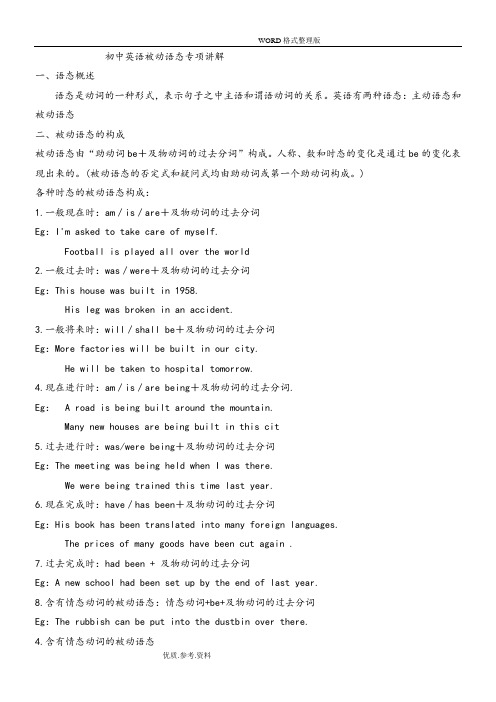
初中英语被动语态专项讲解一、语态概述语态是动词的一种形式,表示句子之中主语和谓语动词的关系。
英语有两种语态:主动语态和被动语态二、被动语态的构成被动语态由“助动词be+及物动词的过去分词”构成。
人称、数和时态的变化是通过be的变化表现出来的。
(被动语态的否定式和疑问式均由助动词或第一个助动词构成。
)各种时态的被动语态构成:1.一般现在时:am/is/are+及物动词的过去分词Eg:I'm asked to take care of myself.Football is played all over the world2.一般过去时:was/were+及物动词的过去分词Eg:This house was built in 1958.His leg was broken in an accident.3.一般将来时:will/shall be+及物动词的过去分词Eg:More factories will be built in our city.He will be taken to hospital tomorrow.4.现在进行时:am/is/are being+及物动词的过去分词.Eg: A road is being built around the mountain.Many new houses are being built in this cit5.过去进行时:was/were being+及物动词的过去分词Eg:The meeting was being held when I was there.We were being trained this time last year.6.现在完成时:have/has been+及物动词的过去分词Eg:His book has been translated into many foreign languages.The prices of many goods have been cut again .7.过去完成时:had been + 及物动词的过去分词Eg:A new school had been set up by the end of last year.8.含有情态动词的被动语态:情态动词+be+及物动词的过去分词Eg:The rubbish can be put into the dustbin over there.4.含有情态动词的被动语态含有情态动词的主动语态变成被动语态时,由“情态动词+be+过去分词”构成,原来带to的情态动词变成被动语态后“to”仍要保留。
初中英语动词被动语态专项训练及答案
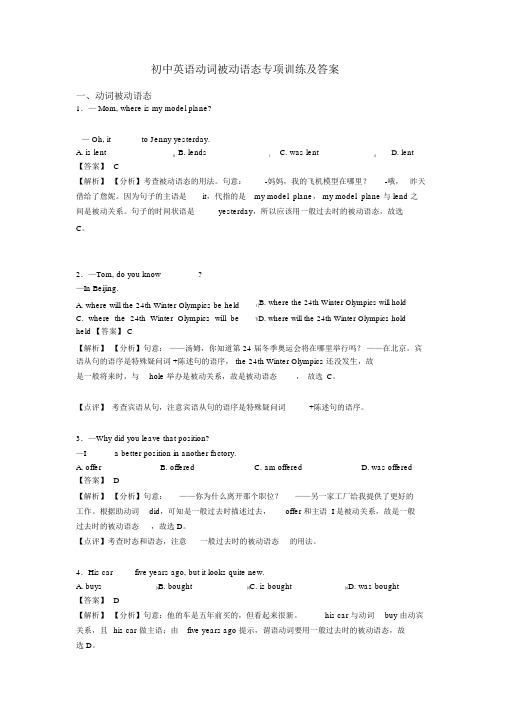
初中英语动词被动语态专项训练及答案一、动词被动语态1.— Mom, where is my model plane?— Oh, it ______ to Jenny yesterday.A. is lentB. lendsC. was lentD. lent 【答案】C【解析】【分析】考查被动语态的用法。
句意:-妈妈,我的飞机模型在哪里?-哦,昨天借给了詹妮。
因为句子的主语是it,代指的是my model plane, my model plane 与 lend 之间是被动关系。
句子的时间状语是yesterday,所以应该用一般过去时的被动语态,故选C。
2.—Tom, do you know ________?—In Beijing.A. where will the 24th Winter Olympics be held C. where the 24th Winter Olympics will be held 【答案】 CB. where the 24th Winter Olympics will hold D. where will the 24th Winter Olympics hold【解析】【分析】句意:——汤姆,你知道第 24 届冬季奥运会将在哪里举行吗?——在北京。
宾语从句的语序是特殊疑问词 +陈述句的语序, the 24th Winter Olympics 还没发生,故是一般将来时,与hole 举办是被动关系,故是被动语态,故选C。
【点评】考查宾语从句,注意宾语从句的语序是特殊疑问词+陈述句的语序。
3.—Why did you leave that position?—I ______a better position in another factory.A. offerB. offeredC. am offeredD. was offered 【答案】D【解析】【分析】句意:——你为什么离开那个职位?——另一家工厂给我提供了更好的工作。
初中英语动词被动语态专项训练100(附答案)含解析
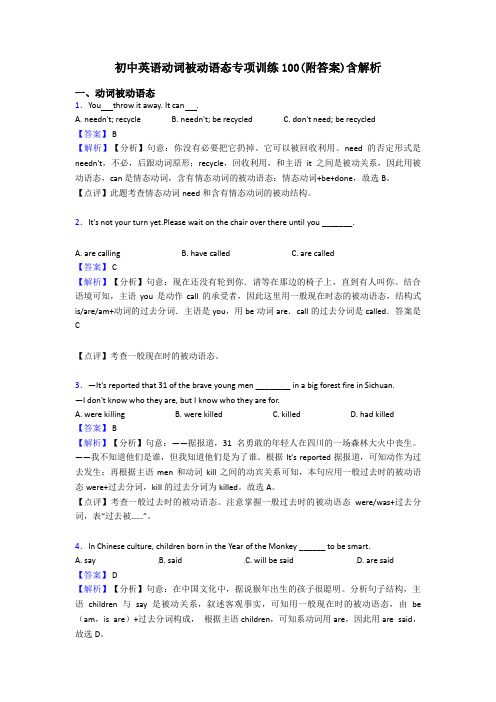
初中英语动词被动语态专项训练100(附答案)含解析一、动词被动语态1.You throw it away. It can .A. needn't; recycleB. needn't; be recycledC. don't need; be recycled【答案】 B【解析】【分析】句意:你没有必要把它扔掉。
它可以被回收利用。
need的否定形式是needn't,不必,后跟动词原形;recycle,回收利用,和主语it之间是被动关系,因此用被动语态,can 是情态动词,含有情态动词的被动语态:情态动词+be+done,故选B。
【点评】此题考查情态动词need和含有情态动词的被动结构。
2.It's not your turn yet.Please wait on the chair over there until you _______.A. are callingB. have calledC. are called【答案】 C【解析】【分析】句意:现在还没有轮到你.请等在那边的椅子上,直到有人叫你。
结合语境可知,主语you是动作call的承受者,因此这里用一般现在时态的被动语态,结构式is/are/am+动词的过去分词.主语是you,用be动词are.call的过去分词是called.答案是C【点评】考查一般现在时的被动语态。
3.—It's reported that 31 of the brave young men ________ in a big forest fire in Sichuan.—I don't know who they are, but I know who they are for.A. were killingB. were killedC. killedD. had killed【答案】 B【解析】【分析】句意:——据报道,31名勇敢的年轻人在四川的一场森林大火中丧生。
初中英语被动语态专项练习(含答案)
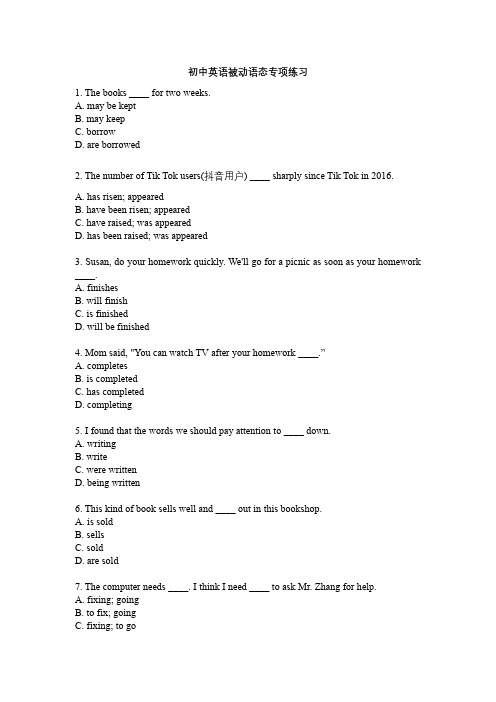
初中英语被动语态专项练习1. The books ____ for two weeks.A. may be keptB. may keepC. borrowD. are borrowed2. The number of Tik Tok users(抖音用户) ____ sharply since Tik Tok in 2016.A. has risen; appearedB. have been risen; appearedC. have raised; was appearedD. has been raised; was appeared3. Susan, do your homework quickly. We'll go for a picnic as soon as your homework ____.A. finishesB. will finishC. is finishedD. will be finished4. Mom said, "You can watch TV after your homework ____.”A. completesB. is completedC. has completedD. completing5. I found that the words we should pay attention to ____ down.A. writingB. writeC. were writtenD. being written6. This kind of book sells well and ____ out in this bookshop.A. is soldB. sellsC. soldD. are sold7. The computer needs ____. I think I need ____ to ask Mr. Zhang for help.A. fixing; goingB. to fix; goingC. fixing; to goD. to fix; to go8. -Do you know the two giant pandas Da Mao and Er Shun ____ to China by Canada's Calgary Zoo due to the difficulty of getting their food of fresh bamboo?-Yes, but the date hasn't been decided.A. will returnB. will be returnedC. were returned9. -Do you know who will be chosen as this year's exchange students to our sister school in New York?-No, this question ____ at present. Let's wait until the name list comes out.A. has been discussingB. will be discussedC. is being discussed10. -The work ____ in two hours.-No problem. Let's do it now.A. should have finishedB. must be finishedC. must finish11. -What's wrong with your grandpa's flower?-Most plants require regularly ____.A. to waterB. wateringC. to be water12. After the Chinese spacecraft's landing on Mars ____ on May 16,2021, we felt even prouder of our country.A. announcesB. announcedC. were announcedD. was announced13. I won't go to her party unless my best friend Jack ____.A. will inviteB. will be invitedC. is invitedD. invites14. -Over the past 70 years, China's high-speed railway ____ fast.-That's rue. The project of Yancheng-Nantong High-speed Railway that goes through Rugao ____by the end of this year.A. has developed; will be completedB. is developing; will completeC. has developed; will completeD. is developing; will be completed15. Math is difficult ____, so you should practice more.A. for learningB. to learnC. with learningD. about learning16. Mr Jackson has no idea ____.A. when was telephone inventedB. when telephone inventedC. when telephone was inventedD. when telephone is invented17. It's known that food and medicine must ____ at a low temperature.A. keepB. be keptC. be keepingD. to keep18. Train tickets ____ out. We had to take a bus.A. soldB. sellsC. were soldD. are sold19. An important report about English study ____ in the Worker's Palace next week. Would you like to join us?A. will be givenB. will giveC. would be givenD. would give20. Mark thinks he ____ to choose his own clothes, because he is no longer a child.A. should allowB. should be allowedC. shouldn't allowD. shouldn't be allowed21. -Excuse me. When can we have the steak we ordered?-Not until it ____ in ten minutes.A. will be preparedB. is preparedC. has preparedD. was prepared22. The English Festival ____ every two years in our school.A. is taken placeB. is taking placeC. takes placeD. holds23. Yang Liwei, together with 13 other pilots of the PLA Air Force, ____ to be an astronaut in January, 1998.A. is chosenB. are chosenC. were chosenD. was chosen24. -Do you have Jay's CDs?-Sorry, they are ____, but I will get some more next week because they ____.A. sold out; sell wellB. on sale; are sold wellC. sold out; are sold wellD. on sale; sell well25. A question was ____ by the reporter, "Mr. President, the price of rice ____ greatly recently. How are you going to deal with the problem?"A. raised; has risenB. risen; is raisingC. raised; is raisingD. risen; has risen26. Nobody but doctors or nurses and those ____ by Dr. Li ____ to enter the patient's room.A. being invited; allowedB. are invited; are allowedC. invited; is allowedD. invited; are allowed27. The physicists propose that our attention ____ the use of special methods of thinking and acting.A. would be directed towardsB. be directed towardsC. is directed towardsD. direct towards28. The milk ____ strange. Do you think it's OK to drink?A. was tastedB. tastedC. is tastingD. tastes29. -The 2022 Winter Olympics ____ in Beijing and Zhangjiakou.-Yes. And my best friend will ____ his girl friend at that time.A. will hold; marryB. will be held; get married withC. will be taken place; get married toD. will take place; marry30. The shoes were worn out, what's more, they aren't worth ____.A. to mendB. mendingC. mended解析:1.keep和borrow都可表示“借”,keep是延续性动词,borrow是短暂性动词。
- 1、下载文档前请自行甄别文档内容的完整性,平台不提供额外的编辑、内容补充、找答案等附加服务。
- 2、"仅部分预览"的文档,不可在线预览部分如存在完整性等问题,可反馈申请退款(可完整预览的文档不适用该条件!)。
- 3、如文档侵犯您的权益,请联系客服反馈,我们会尽快为您处理(人工客服工作时间:9:00-18:30)。
被动语态(Passive Voice)学习目标: 掌握被动语态结构以及时态变换导入:举例把字句和被字句他把门打开了。
门被打开了。
哪个是动作的执行者,哪个是动作的承受者学前自测(发现考点)( )1. Don't worry. Your package ____ here until you come back, so enjoy shopping here.A. has keptB. will keepC. has been keptD. will be kept ( )2. John ___ to come to the teacher's office just now. He may be in trouble.A. was toldB. toldC. has toldD. tells( )3. —I haven't seen John for many years. How's he going?—He broke the law and ____ to prison 2 years ago.A. has sentB. were sentC. was sentD. was sending( )4. —Where are your dogs, Mickey? —The dogs ____ to the pet centre last week.A. is sentB. was sentC. are sentD. were sent( )5. Some beautiful flowers ____ to her daughter on her last birthday.A. are givenB. are givingC. were givenD. were giving ( )6. —It's difficult for the village children to cross the river to school.—I agree with you. I think a bridge ____ over the river.A. will buildB. is builtC. should be builtD. was built( )7. Mr Green ____ 2 minutes to think about the final decision.A. givesB. gaveC. was givenD. will give( )8. —Sandy __ to be hard-working by her parents. —So am I.A. asksB. is askingC. askedD. is asked( )9. I wonder if the talent show ___ next month. If they ____ it, I must get ready for it.A. will hold; holdB. will hold; will holdC. will be held; holdD. is held; will hold ( )10. The garden ____ while the Greens were away from home.A. took good care ofB. was taken good care ofC. taken good care ofD. was taking good care学前自测1-5 DACDC 6-10 CCDCB一、语态概述英语的语态是通过动词形式的变化表现出来的。
英语中有两种语态:主动语态和被动语态。
主动语态表示主语是动作的执行者。
被动语态表示主语是动作的承受者,即行为动作的对象。
他把门打开了。
____________________________________门被打开了。
____________________________________主动态和被动态指的是动词形式,是词法概念;而主动句和被动句则指的是句子结构,从而是句法概念。
所谓主动句就是由主动态动词(词组)作谓语动词的句子,而被动句则是由被动态动词(词组)作谓语动词的句子。
二.被动语态的句法功能1. 当不知道谁是动作的执行者,或没有必要指出谁是动作的执行者时。
Japanese is taught in that school.Some new computers were stolen last night. 一些新电脑在昨晚被盗了。
(不知道电脑是谁偷的)This book was published in 1981.这本书出版于1981年。
2. 当需要强调动作的承受者而不是执行者时。
Her book will be brought tomorrow morning.3. 说话或发表意见时,为了显得客观公正,也常用被动语态。
常用句型:It is said that…据说……It is reported that…据报道……It is hoped that…希望……It is believed that…人们相信……It is said that Japan’s industrial progress after the war was very remarkable.据说战后日本的工业进步非常显著。
主动变被动语态的小技巧:He can carry the basket. →The basket can be carried by him.They can sing some beautiful songs. →Some beautiful songs can be sung by them.总结:上面例句的小规律:△主动语态变为被动语态的方法:1. 把主动语态的宾语变为被动语态的主语。
2. 把谓语动词变为被动结构(be+过去分词),注意虽然其人称和数随主语的变化而变化,但动词的时态保持不变。
3. 把主动语态中的主语放在介词by 之后作宾语,若主语是人称代词,则把主格变为宾语(by 短语可以省略)。
记忆歌诀:宾变主,主变宾,by短语后面跟。
谓语动词变被动,be后“过分”来使用。
主动语态:主语+ 谓语动词+ 宾语(执行者)(承受者)被动语态:主语+ be + 过去分词(+ by + 执行者)(执行者)一般省略【例题精讲】例1.Children (not allow) to play frightening games.例2.The Great Wall (know) by people all over the world.例3.All the buildings (turn) into hospitals recently.例4.How long can these magazines (keep)?Keys:1.aren’t allowed 2.is known 3.have been turned 4.be kept【课堂练习】提高题:1. The vegetables (plant) in the fields next week.2. The soldier was very ill when he (operate) on by Dr. Bethune.3. The password of your email box should (memorize). .4. Liquids can (turn) into gases if their temperatures (make) hot enough.5. The next morning they (find) that some trees (blow) down during the night. Keys:1.will be plated 2.was operated 3.be memorized 4.turn,are made 5.will find ,will be blown三、被动语态的构成观察下列句子,总结变化规律The classroom is cleaned every day. 教室每天被打扫。
The dumplings were made yesterday. 饺子是昨天包的。
The room is being cleaned now. 现在房间正在被打扫。
The two roads had been built by the end of last month. 到上个月末为止,两条公路被建成了。
A new hospital will be built next year. 明年一个新的医院将被建成。
Mike said a new film would be shown. 迈克说一部新电影将上映。
The work must be finished on time. 必须按时完成这项工作。
被动语态的基本结构:____________________各种时态的主动、被动语态的结构如下表(以动词do为例)时态主动语态被动语态一般现在时do/does一般过去时did现在进行时am/is/are +doing现在完成时have/has +done一般将来时will/shall/be going to +do过去进行时was/were +doing过去完成时had + done过去将来时would/should/be going to+ do含有情态动词can/may/must/have to +do★小试身手★请用下面括号内单词的适当形式填空:1) A speech _______________________ (give) this afternoon.2)The classroom_______________________ (clean) every day.3)Some effective measures _______________________ (take) since last year.4)My mother’s favorite vase_______________________ (break) yesterday.5)The book _______________________ (read) four times by the end of last semester.6)An amusement park_______________________ (build) in our city now.7)The technician told me that my watch_______________________ (repair) in 1 hour.8)The problem _______________________ (discuss) this time yesterday.9)He said that he _______________________ (invite) to the party.10)Thousands of trees _______________________ (plant) in this area by the end of this year.11)The clothes _______________________ (deliver) to the poor area next month.主动语态和被动语态的转换陈述句改为被动句Step1:主动语态的宾语用作被动语态的主语Step2:动词结构作相应变化(be+过去分词)Step3:by+主动语态的主语(可省略)Step4:其他照抄He was making a model plane.__________________________________________一般疑问句改为被动句Step1:be动词/情态动词/助动词放句首Step2:主动语态的宾语用作被动语态的主语Step3:被动结构的其他成分Step4:by+主动语态的主语(可省略)Step5:其他照抄Did Mike’s teacher give much homeworkyesterday?__________________________________________特殊疑问句改为被动句Step1:特殊疑问词不变Step2:be动词/情态动词/助动词提前Step3:主动语态的宾语用作被动语态的主语(主动语态特殊疑问词作宾语则这步省略)Step4:被动结构的其他成分Step5:by+主动语态的主语(可省略)Step6:其他照抄When will Jack finish his homework?__________________________________________What did Linda’s father mend last night?__________________________________________★小试身手★请把下列句子变为被动句:1)I was sure people would punish him._________________________________________________2)They may open a new school next year._________________________________________________3)Can the boy pick up heavy weights?_________________________________________________4)Will your mother kiss you on your wedding day next week?_________________________________________________四、被动语态的易错点1. 主动语态变为被动语态①要将主动句里的宾语变为被动句中的主语,若主动句中的宾语是人称代词,要将宾格变成主格。
